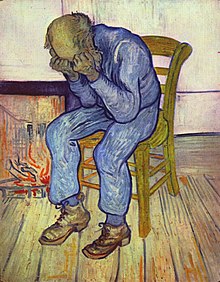Depression (mood)
Depression is a state of low mood and not wanting to do anything. It can change what a person thinks, does, feels, and sense of well-being. It may lead to being sad, make it harder to think and a large change in appetite and time spent sleeping. People who have depression may feel no hope and, sometimes, thoughts of suicide. It can either be short term or long term.[1] The main symptom of depression is said to be anhedonia, which means losing of interest in things that usually make people happy.[2] Depressed mood is a symptom of some mood disorders such as major depressive disorder or dysthymia;[3] it is a normal reaction to life events, such as losing a loved one; and it is also caused by some physical diseases and a side effect of some drugs and medical treatments.

References change
- ↑ de Zwart PL, Jeronimus BF, de Jonge P, et al. (October 2019). "Empirical evidence for definitions of episode, remission, recovery, relapse and recurrence in depression: a systematic review". Epidemiology and Psychiatric Sciences. 28 (5): 544–562. doi:10.1017/S2045796018000227. PMC 7032752. PMID 29769159.
- ↑ Gilbert, Paul (2007). Psychotherapy and counselling for depression (3rd ed.). Los Angeles: SAGE. ISBN 9781849203494. OCLC 436076587.
- ↑ Diagnostic and Statistical Manual of Mental Disorders, Fifth Edition (DSM-5). American Psychiatric Association. 2013.